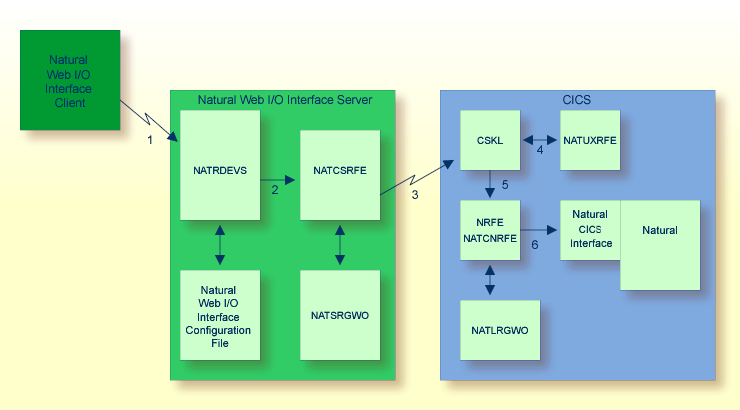This Dokument describes the purpose and the functions of the Natural Web I/O Interface Server CICS Adapter.
The following topics are covered:
The Natural Web I/O Interface Server CICS Adapter is designed for a mainframe Natural context where it enables the use of a Natural Web I/O Interface server, running under z/OS in batch mode within a CICS TP monitor environment.
The CICS support is not implemented within the front-end stub
NATRNWO. For dispatching the Natural sessions in CICS, the Web I/O
Interface server continues to run in batch mode or under SMARTS. But it uses
the remote front-end NATCSRFE that is delivered with the Natural
Web I/O Interface server to dispatch the Natural sessions in CICS. That is,
depending on the installed front-end, a server dispatches the sessions locally
(NCFNUC for SMARTS, NATMVS for batch mode) or
remotely (NATCSRFE for CICS).
NATCSRFE in turn accepts the Natural request from
NATRNWO and transfers it to a configured CICS environment using
the CICS Socket Interface. Within the CICS environment, a CICS Natural
transaction is launched that processes the Natural request and returns the
result. Thus it is not necessary to execute the entire Web I/O Interface server
under CICS. Only if Natural is requested to run the Natural application,
control is transferred to CICS for execution.
The Natural Web I/O Interface Server CICS Adapter comprises the following components:
The following figure illustrates the interaction between the Natural Web I/O Interface server and the CICS environment involved.

The Web I/O Interface (NWO) client sends a request to the Natural Web
I/O Interface server using the port number specified with the Natural Web I/O
Interface server configuration variable
PORT_NUMBER.
The Natural Web I/O Interface server dispatches the Natural session
using the Natural front-end you have specified with the Natural Web I/O
Interface server configuration variable
FRONTEND_NAME. Specify NATCSRFE in
order to use the Natural Web I/O Interface Server CICS Adapter.
NATCSRFE transmits the request to the host/port specified with the
Natural Web I/O Interface server configuration variable
RFE_CICS_TA_HOST /
RFE_CICS_TA_PORT. You must configure the
CICS-supplied standard listener CSKL
to listen at this port.
If the Natural Web I/O Interface server is configured to perform
remote impersonation (SECURITY_MODE=IMPERSONATE/IMPERSONATE_REMOTE),
NATUXRFE is called to authenticate the client. If the
authentication succeeds, CSKL launches the CICS transaction
NRFE under the account of the client (impersonated).
CSKL launches the CICS transaction you have specified
with the Natural Web I/O Interface server configuration parameter
RFE_CICS_TA_NAME (NRFE in this example).
This transaction must be defined to use the program NATCNRFE.
NATCNRFE finally dispatches the Natural session using the
Natural CICS front-end you have specified with the Natural Web I/O Interface
server configuration parameter
RFE_CICS_FE_NAME.